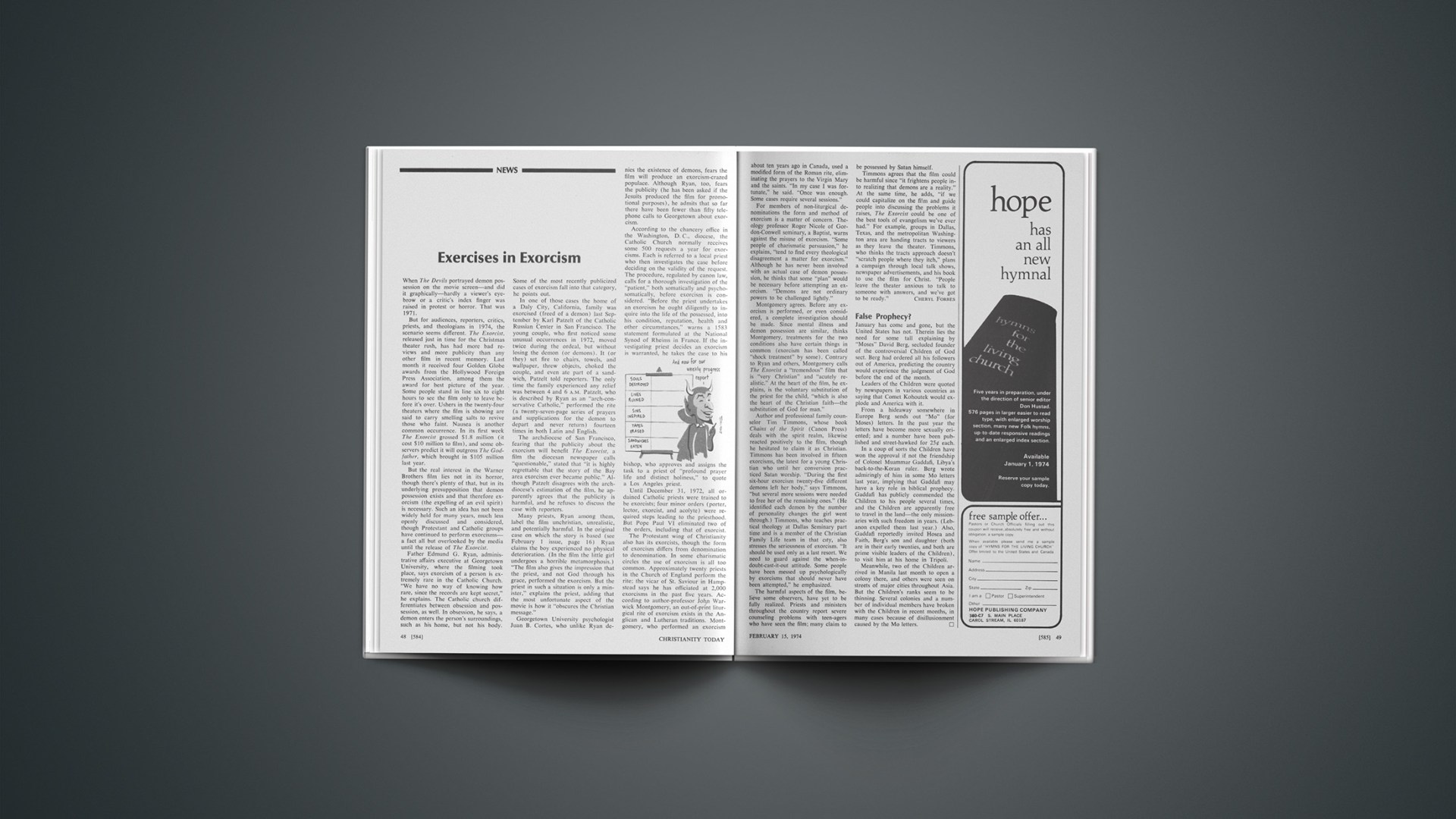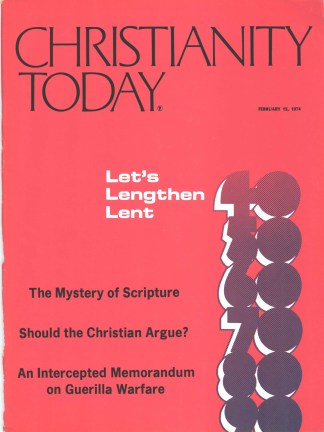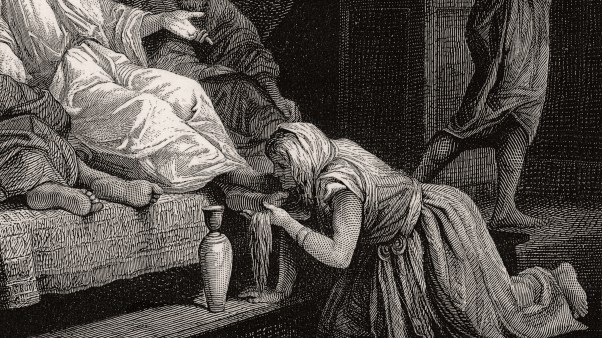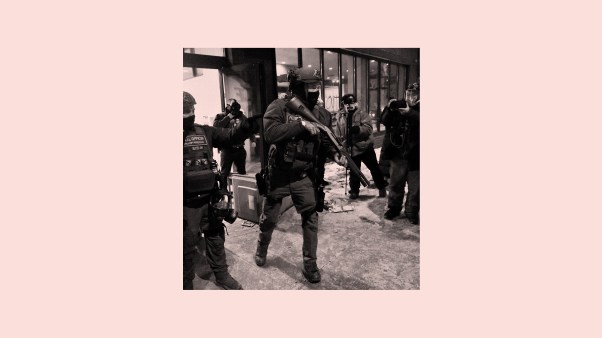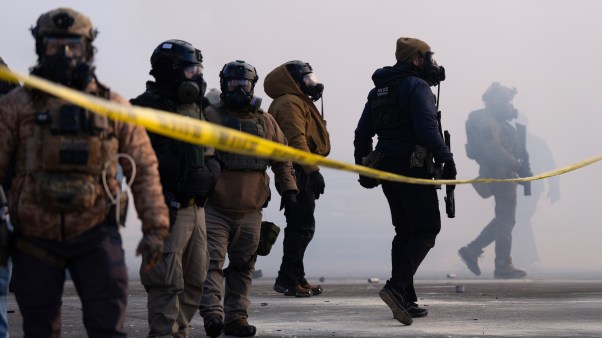The long-expected showdown over alleged theological liberalism in the Lutheran Church-Missouri Synod (LCMS) got under way late last month amid a flurry of actions. There were these developments:
• On January 20 the conservative-dominated controlling board of Concordia Seminary (St. Louis) suspended the seminary’s president, John H. Tietjen, 45, for alleged malfeasance and advocacy of false doctrine.
• In reaction, the students voted the next day to boycott classes until the issues are settled.
• Late on January 21 about 40 of the 43 teachers of the so-called liberal faculty majority and a dozen seminary staffers declared themselves suspended in solidarity with Tietjen.
• The board appointed conservative professor Martin H. Scharlemann, 63, as acting president, a move rejected by many of the teachers.
• The board also replaced three liberal department heads with conservatives, retired three liberals, and withdrew nineteen elective courses from the catalog.
• Educators of the American Lutheran Church and Lutheran Church in America spoke out in defense of the Concordia faculty majority.
• At month’s end fourteen LCMS district presidents huddled in St. Louis to draft recommendations concerning Concordia and the doctrinal controversy within the denomination. These were to be submitted to an unscheduled meeting of all thirty-eight district presidents in Chicago this month.
• Also at month’s end the LCMS board of directors was deliberating behind closed doors, and opposing forces were lining up throughout the denomination.
• Meanwhile, the LCMS board of missions fired South Asia secretary James Mayer and created a task force to study—and possibly restructure somewhat—the missions program, prompting a revolt of virtually the entire eighteen-member missions division headquarters staff in St. Louis.
Most of the trouble stems from attempts by LCMS leaders to implement actions taken at the denomination’s tumultuous convention in New Orleans last summer (see August 10, 1973, issue, page 40). At that convention the delegates adopted a strongly worded statement on biblical inspiration and interpretation that had been drafted by LCMS president Jacob A. O. Preus, a conservative concerned about liberal trends at Concordia. The statement was made constitutionally binding, and the delegates instructed Concordia’s board to examine the teachers in light of it and to deal with Tietjen. (Prior to the convention Tietjen and the faculty majority had voiced opposition to the statement.)
A long list of charges were cited in the board’s suspension of Tietjen last month. They include administrative irresponsibility, failure to discipline faculty members, defiance of Preus and LCMS officials, taking part in protests, allowing false teaching on campus, and the like. Tietjen, seeing “no possibility of a fair and impartial judgment,” said he would defend himself no further, even though it might cost him his pastoral credentials as well as his job. Despite legal assurances that he could win in court, said Tietjen, he decided for scriptural reasons not to file a lawsuit.
The charges are “absurd—a piece of harassment and propaganda,” asserted the faculty majority. The teachers appealed to Preus either to direct the board to proceed promptly with establishing their guilt of teaching false doctrine (for which they should be replaced) or to take the lead “in clearing us—John Tietjen and all the rest of us,” at which they would return to the classrooms.
Preus, pleading that due process could take months, several times asked the professors to go back to their jobs. He held out three options to them: repent, resign, or await due process. The board promised to act “with all deliberate haste.”
Tietjen complained of efforts behind the scenes to arrange an immoral “deal” whereby he would resign and accept a call to a church job in a friendly district. In exchange, he said, there were promises that a moratorium would be placed on actions against faculty members and that charges against him would not be pursued. Such possibilities were indeed being discussed at top levels in the LCMS; some had been initiated by LCMS information officer Vic Bryant and Concordia’s publicist Larry Neeb. Preus and Tietjen were kept informed of progress. Bryant says the talks should be seen as attempts at “conciliation,” not deals.
Concordia, with about 600 undergraduate students and 70 graduate students, is the largest Lutheran seminary in America.
The resident students voted 274 to 92 (with 15 abstentions) to stay out of class until the board makes public which faculty members are false teachers and why. They also launched a campaign to travel to LCMS churches throughout the nation to plead their cause. Meanwhile they ignored pleas of Scharlemann and the board to return to classrooms. (Conservative sources said they could come up with enough instant faculty members to complete the school year if the regular teachers continue the strike, but if the students stay out the school would be forced to close.)
In a further controversial move the board voted to appoint Scharlemann to replace Alfred Von Rohr Sauer as head of the exegetical department, Richard Klann to replace Robert W. Bertram as head of systematic theology, and Robert Preus (Jacob’s brother) to replace John Constable as head of historical theology. Robert Preus was also named vice president of academic affairs; he will serve as Scharlemann’s executive officer.
The dissident faculty majority members said they could not in good conscience accept Scharlemann as president, and they called on him to resign, a request he ignored.
A capacity crowd of more than 1,600 persons filled the Concordia Field House in a display of enthusiastic support for Tietjen and his colleagues. It was sponsored by Evangelical Lutherans in Mission (ELIM), a national coalition organized in opposition to Preus and the Missouri Synod’s conservative leaders. In one section sat a cluster of children of Concordia professors, waving signs bearing the message: “We’re behind our fathers.”
Religious Broadcasters: Someone Understands
If a standing ovation and a long line of well-wishers are an indication, members of the National Religious Broadcasters (NRB) organization feel they’ve finally found an official of the Federal Communications Commission who understands them: FCC commissioner Richard E. Wiley.
Wiley, a United Methodist, was one of the main speakers at last month’s annual meeting in Washington, D. C., of the 31-year-old National Religious Broadcasters organization. The event drew nearly 1,000 delegates—a record.
Telling it straight out, Wiley urged the broadcasters to emphasize a personal God and the necessity of rebirth, to use their “electric pulpits” to reach the unchurched “and those who do not know the Lord.” He told them to stop airing “parochial” programs that reach only a select few, to distinguish between gospel preaching and the promotion of partisan sectarian philosophies, and to eschew programming that is essentially a pitch for contributions. Such programming, he asserted, only demeans the true Gospel.
In an interview, Wiley described himself as a “concerned, committed layman” with conservative religious roots. He said the NRB speech was one of the few times he’d expressed his religious views strongly in public. (Appointed to the FCC in January, 1972, Wiley is reportedly in front place to succeed Dean Burch as FCC chairman. Burch’s departure is imminent.)
The convention as always featured a number of well-known musicians and speakers, panel discussions, and workshops. Campus broadcasters met to form a new association to service their sector, Canadians discussed plans for an NRB type of group in their country, and overseas broadcasters spoke of forming an international association under the umbrella of the World Evangelical Fellowship (most NRB members are evangelicals).
Some 150 women attending the three-day convention toured the White House and met briefly with Mrs. Nixon. Later she told reporters that many of the women voiced support for the President. “I asked them to pray for the press,” she added.
Clearly, however, NRB attention centered on the FCC and its regulations. In accepting an NRB merit award, chairman Burch said the relation between the FCC and the NRB is “just right: the FCC is not your best friend, but neither is it your worst enemy.” A question-answer period with FCC officials dealt mostly with the issue of religious discrimination in employment practices and with an FCC-inaugurated study of its so-called Fairness Doctrine.
The discrimination issue stems mostly from a case involving station KGDN in Seattle, now awaiting a court decision. Two years ago it was charged with violating FCC regulations by requiring certain religious beliefs as a condition for employment (see February 16, 1973, issue, page 50). After an NRB request last year for an interpretation of the rule, the FCC broadened its position, saying that writers, producers, and other staff concerned with content can now be required to hold beliefs similar to those of the employer (previously only on-air staffers were included).
The FCC’s review of its fairness regulations is part of a program to update rules and clarify them for broadcasters, Wiley said in the interview. He denied charges circulating in some circles that the FCC is engaged in a conspiracy to silence Christian broadcasts. (Radio preacher Carl McIntire and his followers have stirred up a movement in Congress to overhaul or scrap the fairness rules. Senator Sam Ervin is a leading critic of the FCC, and he has spoken out in McIntire’s behalf. After a six-year struggle, McIntire last fall lost his bid to renew his license for station WXUR in suburban Philadelphia, the first to be silenced in a matter involving the Fairness Doctrine.)
Wiley insists that loss of license will occur only where there are “unreasonable, flagrant, and abusive violations of the rules.”
FCC officials say that complaint mail involving religious broadcasters is “miniscule.” They point out also that more religious stations than ever are operating.
And so, while the broadcasters feel they’ve found someone on the FCC who understands them, it is evident that the broadcasters for the most part have understood the FCC.
BARRIE DOYLE
Canada: Raising The Standards
On his recent visit to Canada, Anglican bishop Stephen Neill, who has held important posts on three continents, was quoted as saying that Canadian clergy have traditionally had one of the lowest standards of theological education in the world.
The situation seems to be changing, though, at least for evangelicals. Optimism prevailed among thirty-three Christian leaders who met last month for a one-day conference on graduate-level evangelical theological education in Canada. The conference, held at Toronto’s Ontario Bible College, was called by church-history professor Ian S. Rennie of Regent College in Vancouver. Representatives were invited from all Canadian theological colleges that have an essentially evangelical orientation. Also present were key evangelicals teaching at other schools, along with some who have special interest in the matter, such as Inter-Varsity Christian Fellowship personnel.
Among the varied institutions represented were established theological colleges, such as Acadia Divinity College (Baptist) of Wolfville, Nova Scotia, and Wycliffe College (Anglican) of Toronto; Bible colleges that have recently developed seminary programs (Winnipeg Bible College); experimental institutions such as Regent College, which concentrates on lay-theological education at the graduate level; and the Institute for Christian Studies of Toronto, which focuses on foundational research in the traditional academic disciplines.
All conferees reported a growing interest in graduate studies at their institutions plus plans for expansion. Currently there are about 330 full-time graduate students in the institutions represented, plus part-time and extension students. Plans were announced for several new theological colleges and graduate divisions.
The conference concluded with a call for evangelicals to cooperate in expanding graduate theological education, and a committee was elected to plan further discussions.
W. WARD GASQUE
Watch On The World
Keeping watch on the world is one of the functions of the World Alliance of Reformed Churches (WARC), which represents over 55 million communicant members in 137 church bodies in 80 countries.
Its bonds of fellowship extend through Congregational, Presbyterian, Reformed, and United churches around the globe. Two-thirds of alliance members are in Third World countries, and three are in the Soviet Union.
President James I. McCord of Princeton Seminary, area council secretary of the WARC, describes the alliance as “the most international of all non-Roman Catholic organizations.” It takes freedom seriously, he claims, because its members historically have come from minorities that have had to struggle for religious freedom.
This may explain why the North American Area Council (NAAC) of the WARC, meeting at Stony Point, New York, last month, dealt with specific alleged violations of human rights and suppressions of individual freedom in various countries.
Among those singled out was the United States. The Committee on Civil and Religious Liberty urged NAAC churches “to use all the means available to them to encourage the adoption [by the United States] of a policy of general amnesty toward those who have refused to participate in Viet Nam.”
United Church of Canada leader Ernest E. Long reported on the recent detention and arrest, on charges of violating Selective Service laws, of three young men born in the United States but now citizens of Canada. They are the Reverend Tom York, a United Church minister, James Ince, a student at York University, and Gavin Naeve, now working in Bermuda. The arrests of the first two took place when they visited the United States, while Naeve was in transit through a New York airport.
“Such arrest of Canadian citizens will constitute confirmed harassment of many such young people,” said Long. NAAC delegates agreed to ask the American Civil Liberties Union to investigate such cases, and they also asked U. S. church bodies to intervene with American officials on behalf of nonresident aliens.
Another area of discussion was South Korea and the conflict there between church and state (see February 1 issue, page 40). Delegates applauded South Korean Presbyterian churchmen for their leadership in the freedom cause, assured churches there of NAAC solidarity with them, and authorized a press statement expressing concern for destruction of religious and civil liberties in Korea.
Additionally, the council condemned the use of torture on political prisoners throughout the world following a report by the Reverend Edmond Perret of Geneva, secretary of the World Alliance of Reformed Churches, who attended a fall conference on torture sponsored in Paris by Amnesty International.
Elsewhere on the agenda there were reports on doctrinal and ecclesiastical conversations being carried on between WARC and Catholic, Lutheran, and Orthodox theologians. Long was elected NAAC chairman, succeeding a layman from Trinidad, Samuel A. Meighlal. The eighty delegates included six from Guyana and two from Jamaica.
DECOURCY H. RAYNER

